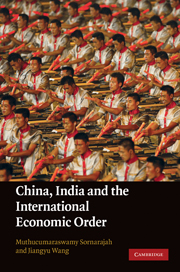Book contents
- Frontmatter
- Contents
- Notes on contributors
- Preface
- Introduction and overview
- PART I China, India and the global trade system
- 1 The WTO and development policy in China and India
- 2 China, India and developing countries in the WTO
- 3 China–India cooperation, South–South coalition and the new international economic order
- 4 India, China and foreign investment
- 5 China, India and WTO Law
- 6 China, India and the WTO dispute settlement system
- 7 China, India and dispute settlement in the WTO and RTAs
- 8 China, India and global outsourcing of services under GATS
- 9 International dispute settlement
- PART II China, India and regional economic integration in Asia
- PART III Law and development in China and India: Domestic issues
- Index
- References
5 - China, India and WTO Law
from PART I - China, India and the global trade system
Published online by Cambridge University Press: 03 May 2011
- Frontmatter
- Contents
- Notes on contributors
- Preface
- Introduction and overview
- PART I China, India and the global trade system
- 1 The WTO and development policy in China and India
- 2 China, India and developing countries in the WTO
- 3 China–India cooperation, South–South coalition and the new international economic order
- 4 India, China and foreign investment
- 5 China, India and WTO Law
- 6 China, India and the WTO dispute settlement system
- 7 China, India and dispute settlement in the WTO and RTAs
- 8 China, India and global outsourcing of services under GATS
- 9 International dispute settlement
- PART II China, India and regional economic integration in Asia
- PART III Law and development in China and India: Domestic issues
- Index
- References
Summary
Introduction
The establishment of the World Trade Organization (WTO) has transformed a mostly power-oriented world trading system under the General Agreement on Tariffs and Trade (GATT) into a mostly rule-oriented one. In this rule-oriented system, law, as opposed to power and diplomacy, serves as the anchor of international trade relations. The WTO claims broad jurisdiction over trade in goods, trade in services, and trade-related intellectual property rights, and its rules penetrate into the traditionally domestic regulatory space of sovereign nations more than those of any other international organization ever did. Furthermore, the WTO is equipped with a dispute settlement mechanism that features compulsory adjudication and binding decisions upon its 150-plus members. Since its inception, the WTO dispute settlement system has generated a growing body of jurisprudence that has become an important part of international law.
This article seeks to assess and compare the respective contributions of China and India to the development of WTO law. It does so by examining the practices of the two countries in the WTO rulemaking and adjudicatory processes. Although the two countries have very different backgrounds in their association with the world trading system – India has been inside the system since 1948, first as an original contracting party to the GATT and then an original member of the WTO, whereas China only acceded to the WTO in late 2001 – a comparison between the two can nevertheless be meaningful because of their many similarities.
- Type
- Chapter
- Information
- China, India and the International Economic Order , pp. 167 - 216Publisher: Cambridge University PressPrint publication year: 2010
References
- 2
- Cited by



